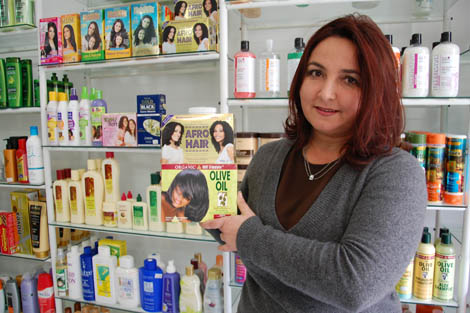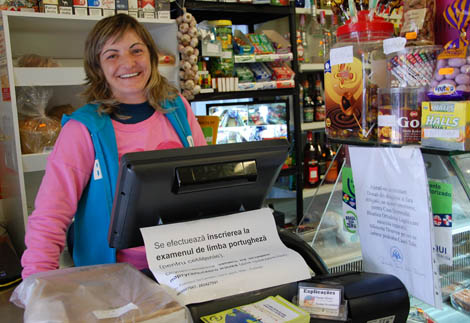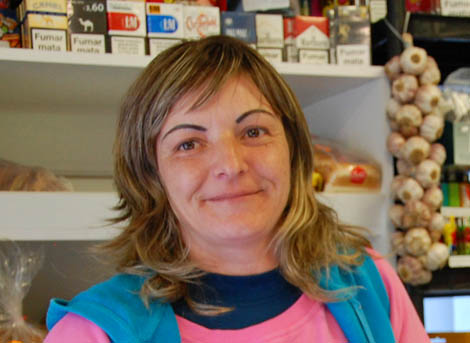 When talking to people who have migrated, of all nationalities and anywhere in the world, the biggest homesickness they reveal are family, first, and then food from their country. Because in Portimão there are several stores where you can buy products from countries of origin of immigrants and the Sul Informação went on to discover two of them.
When talking to people who have migrated, of all nationalities and anywhere in the world, the biggest homesickness they reveal are family, first, and then food from their country. Because in Portimão there are several stores where you can buy products from countries of origin of immigrants and the Sul Informação went on to discover two of them.
On Rua Direita, one of the busiest commercial arteries in Portimão, two Brazilian stores are located side by side. The smallest is the «Mini Mercado Alô Brasil» which is managed by Mônica Medeiros, 39, born in the Brazilian state of Natal, in the north of the country.
The store's shelves are full of products from Brazil, especially cosmetics, beauty and food. But there are products from other sources, to attract more customers.
Pastry dough, spices, pequi pulp (made from a fruit and used with chicken or rice), cream, various products needed to make a real Brazilian feijoada (such as jerky, that is, salted meat and dry in the sun), all of this is sold at Mônica Medeiros' mini market. «Brazilians, but also Portuguese, come here to buy these products when they want to make a very typical meal», he explains.
But most of the store's business is done with the sale of cosmetics, especially hair care products, and there the majority of customers are «Africans», as Mônica Medeiros reveals. “My African customers like quality cosmetics and they find it here. They come here and say, "I want this." It may even cost 100 euros, but they pay and take it away», guarantees the businesswoman.
 When the Sul Informação visited the «Mini Mercado Alô Brasil» one of the customers who entered was precisely a young woman of Cape Verdean origin, but already born in Portugal, who bought a hair care product.
When the Sul Informação visited the «Mini Mercado Alô Brasil» one of the customers who entered was precisely a young woman of Cape Verdean origin, but already born in Portugal, who bought a hair care product.
Mônica (“with a caret on the o”, as she insists on saying) came to Portugal three years ago, “by chance”, to visit a cousin and ended up staying in Portimão, first working in a cafe and then opening the mini market. His shop, he guarantees, in addition to being a trading house, is also a kind of sentimental office and a meeting place for many people, Brazilians and Portuguese, who came to know him there and who «come here to talk, to let off steam».
One of the clients is D. Carmen, from the «Grill Brasil» restaurant, located a short distance away. Originally from the state of Piauí, D. Carmen insists on presenting herself as a “widow, evangelical and honest”.
Honesty is, in fact, an aspect that Mônica also underlines. "I open my mouth and just because I'm Brazilian they label me a prostitute," laments the young businesswoman. "But 99% of Brazilians who came to Portugal are honest and hardworking people." Back home, he recalls, she was “the manager of a large class A furniture store”, where she worked with her father.
As for her host country, Mônica says she likes the country and the people, but criticizes the “closed” character of the Portuguese, whom she accuses of having “a very mediocre head”.
Even so, he guarantees, a large part of the customers of his «Mini Mercado Alô Brasil», on Rua Direita, in Portimão, are Portuguese and «good people». And he recommends: whoever wants a good product for the hair or skin, or finds everything needed for a truly Brazilian feijoada, just has to go to his store, where «service is paramount». And Monica confirms this information, giving a big smile.
A Romanian supermarket that is a Portuguese neighborhood store
 Cláudia Dragus and her husband's Romanian supermarket is located on a street across Avenida 25 de Abril, opposite Cedipraia, also in Portimão. On the outside, the store is identified in Romanian and Portuguese, to satisfy customers, who are of both nationalities…and many others.
Cláudia Dragus and her husband's Romanian supermarket is located on a street across Avenida 25 de Abril, opposite Cedipraia, also in Portimão. On the outside, the store is identified in Romanian and Portuguese, to satisfy customers, who are of both nationalities…and many others.
Inside, products from Cláudia's native Romania mix with those of Portuguese origin. And there are even products from international brands, but with Romanian packaging, written in this Latin language. This is the case, for example, of broth cubes to be placed in soups or other dishes, which bear international brands, but came from that eastern country. «My Portuguese customers already know what it is and don't mind buying it even if it's in Romanian», guarantees the businesswoman.
The grocery store has a lot of charcuterie (sausages, ham, chorizo) from home, which have "a different flavor from those made here in Portugal", but also drinks, cheeses, cream and fermented cabbage that is the base of one of the Romanian traditional dishes, the sarmale.
Cláudia goes to the fridge to get one of those fermented cabbages, vacuum-packed, and explains: “This is cabbage in vinegar. To do sarmale, this cabbage is used, with ground pork, onions, peppers. Wrap the meat in the cabbage». With a saleswoman's instinct, Cláudia guarantees: «It's very good. All my Portuguese friends who have tried it, liked it!».
In addition to Portuguese and Romanian products, the small supermarket also sells products from Bulgaria. “Some customers are Bulgarian and, as it is difficult to find things from their land, they asked us to start ordering and that's what we did”.
Claudia and her husband came from Romania 14 years ago. He worked in civil construction for about a decade and she, after a brief spell in cleaning, spent 13 years in a pizzeria in Portimão, where she made "great friends". Her bosses at the restaurant were even the godparents of her daughter, who was born in Portugal and "is all Portuguese".
 But one day, with some money saved up and because her husband was lacking work in a sector where the crisis was already coming, they decided to take a risk and invest in this neighborhood grocery store.
But one day, with some money saved up and because her husband was lacking work in a sector where the crisis was already coming, they decided to take a risk and invest in this neighborhood grocery store.
Most of its customers are Portuguese neighbors, who live in the buildings in the area. The supermarket sells everything, but serves in particular as a neighborhood convenience store, where you buy bread, fruit and some other goods.
As for Romanians and other immigrants from the East, Cláudia stresses that, "because of the lack of work, there are now fewer and fewer people from these countries in Portimão."
Living in the Algarve for almost a decade and a half, the businesswoman does not plan to return to her country of origin anytime soon. “When I arrived here, I cried a lot, because I didn't understand anything about the language. But then I made many friends, I already have a daughter who was born here, we bought a house here, we have the business. I don't expect to go back there, in Romania there is no work, the prices are almost like in Portugal and the salary is 250 euros».
The usual homesickness for her family is mitigated by the fact that Cláudia has a brother and a sister around here. And just last year, he returned to his native Romania, with his daughter, for an extended vacation of two months. She just feels sorry for not being able to travel at the same time as her husband, “but someone always has to stay here in the store, because of the business”, she explains.
Therefore, when asked about the future, Cláudia Dragus replies that he is passing through Portugal, where he feels «very well, with many friends». «My daughter was born here in 2003 and is Portuguese».
While talking to the Sul Informação, Cláudia turns to serve a Portuguese client, who lives in a neighboring building. «Hello Claudia, is there still bread from Senhora do Verde?». «Hello Mr. António. There still is, yes. I'll get it right away».
Next to the cash register, where he makes his change for Mr. António, there is a small sign in Romanian and Russian, announcing Portuguese lessons for those who want to take the necessary exam to obtain nationality.
And Portuguese nationality, is Claudia thinking about asking for it? “I don't need it, I have permanent residence until 2018. And I plan to stay even longer. Most immigrants who ask for nationality want to use their Portuguese passport to go to another country in Europe, such as Germany or England. I'm fine here!” he concludes.


















Comments